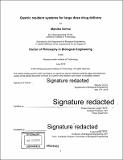Gastric resident systems for large dose drug delivery
Author(s)
Verma, Malvika.
Download1127292014-MIT.pdf (17.50Mb)
Other Contributors
Massachusetts Institute of Technology. Department of Biological Engineering.
Advisor
Robert Samuel Langer.
Terms of use
Metadata
Show full item recordAbstract
Lack of medication adherence is a worldwide problem. As many as 50-70% of patients have trouble following treatment recommendations. Whereas adherence is driven by many factors including the socioeconomic status of a patient and the quality of the health care team, drug regimen complexity also affects treatment outcomes. For example, adherence decreases as the number of pills per dose and the number of doses per day increases. For diseases where potent medications are available, depot formulations provide sustained drug release to simplify dosing. For diseases lacking potent compounds for treatment, there remains an unmet need for depot systems that could transform medication adherence. Tuberculosis (TB) is one such disease with a high pill burden, where poor patient adherence to the treatment regimen is a major cause of treatment failure and contributes to the emergence of drug-resistant TB strains. For example, an average 60-kg patient with TB needs to take 3.3 g of antibiotics per day, which is a dose that exceeds the largest swallowable capsule and current depot systems. According to the World Health Organization (WHO), 10 million people developed TB in 2017 with a global economic burden amounting to $12 billion annually. This thesis presents a solution to the challenge of prolonged dosing for regimens such as TB that require multigram drug dosing. First, a gastric resident system (GRS) compatible with transesophageal administration was designed using biocompatible materials. The GRS consists of a series of drug pills on a coiled superelastic nitinol wire; the ends are protected with a retainer and tubing. Safe administration, gastric retention for 1 month, and retrieval of the GRS were demonstrated in a swine model. Next, sustained release formulations for 6 TB antibiotics were formulated into drug-polymer pills, and first-order drug release kinetics were achieved in vitro. Then, the GRS was demonstrated to be capable of safely encapsulating and releasing 10 grams of an antibiotic over the period of weeks in a swine model. Lastly, end-user assessment was evaluated with a field questionnaire in India and an economic model to estimate the impact of the GRS on the health care system. There are multiple applications of the GRS in the field of infectious diseases, as well as for other indications where multigram depots could impart meaningful benefits to patients, helping maximize adherence to their medication.
Description
Thesis: Ph. D., Massachusetts Institute of Technology, Department of Biological Engineering, 2019 Cataloged from PDF version of thesis. Includes bibliographical references (pages 154-176).
Date issued
2019Department
Massachusetts Institute of Technology. Department of Biological EngineeringPublisher
Massachusetts Institute of Technology
Keywords
Biological Engineering.